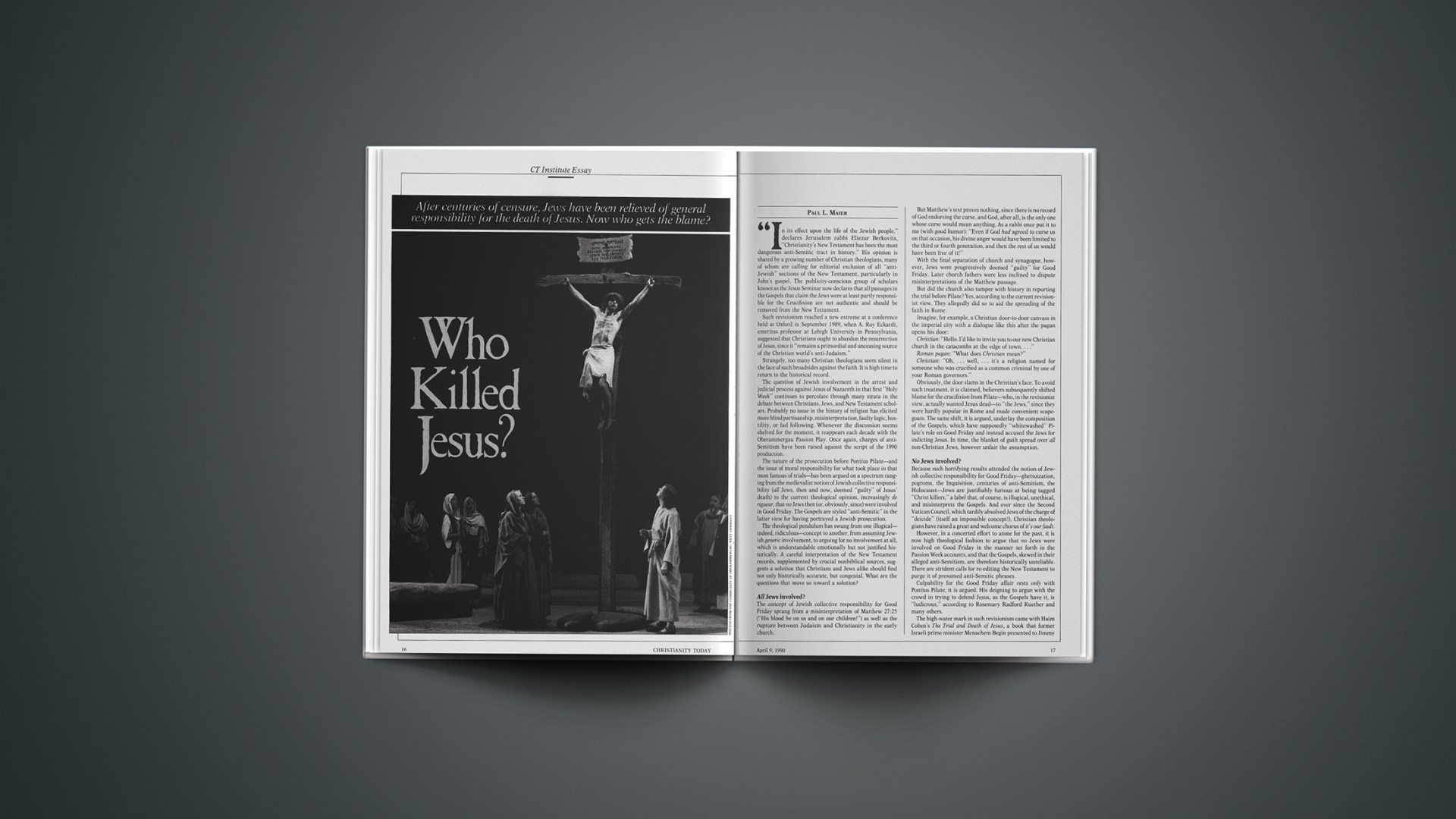After centuries of censure, Jews have been relieved of general responsibility for the death of Jesus. Now who gets the blame?
“In its effect upon the life of the Jewish people,” declares Jerusalem rabbi Eliezar Berkovits, “Christianity’s New Testament has been the most dangerous anti-Semitic tract in history.” His opinion is shared by a growing number of Christian theologians, many of whom are calling for editorial exclusion of all “anti-Jewish” sections of the New Testament, particularly in John’s gospel. The publicity-conscious group of scholars known as the Jesus Seminar now declares that all passages in the Gospels that claim the Jews were at least partly responsible for the Crucifixion are not authentic and should be removed from the New Testament.
Such revisionism reached a new extreme at a conference held at Oxford in September 1989, when A. Roy Eckardt, emeritus professor at Lehigh University in Pennsylvania, suggested that Christians ought to abandon the resurrection of Jesus, since it “remains a primordial and unceasing source of the Christian world’s anti-Judaism.”
Strangely, too many Christian theologians seem silent in the face of such broadsides against the faith. It is high time to return to the historical record.
The question of Jewish involvement in the arrest and judicial process against Jesus of Nazareth in that first “Holy Week” continues to percolate through many strata in the debate between Christians, Jews, and New Testament scholars. Probably no issue in the history of religion has elicited more blind partisanship, misinterpretation, faulty logic, hostility, or fad following. Whenever the discussion seems shelved for the moment, it reappears each decade with the Oberammergau Passion Play. Once again, charges of anti-Semitism have been raised against the script of the 1990 production.
The nature of the prosecution before Pontius Pilate—and the issue of moral responsibility for what took place in that most famous of trials—has been argued on a spectrum ranging from the medievalist notion of Jewish collective responsibility (all Jews, then and now, deemed “guilty” of Jesus’ death) to the current theological opinion, increasingly de rigueur, that no Jews then (or, obviously, since) were involved in Good Friday. The Gospels are styled “anti-Semitic” in the latter view for having portrayed a Jewish prosecution.
The theological pendulum has swung from one illogical—indeed, ridiculous—concept to another, from assuming Jewish generic involvement, to arguing for no involvement at all, which is understandable emotionally but not justified historically. A careful interpretation of the New Testament records, supplemented by crucial nonbiblical sources, suggests a solution that Christians and Jews alike should find not only historically accurate, but congenial. What are the questions that move us toward a solution?
All Jews Involved?
The concept of Jewish collective responsibility for Good Friday sprang from a misinterpretation of Matthew 27:25 (“His blood be on us and on our children!”) as well as the rupture between Judaism and Christianity in the early church.
But Matthew’s text proves nothing, since there is no record of God endorsing the curse, and God, after all, is the only one whose curse would mean anything. As a rabbi once put it to me (with good humor): “Even if God had agreed to curse us on that occasion, his divine anger would have been limited to the third or fourth generation, and then the rest of us would have been free of it!”
With the final separation of church and synagogue, however, Jews were progressively deemed “guilty” for Good Friday. Later church fathers were less inclined to dispute misinterpretations of the Matthew passage.
But did the church also tamper with history in reporting the trial before Pilate? Yes, according to the current revisionist view. They allegedly did so to aid the spreading of the faith in Rome.
Imagine, for example, a Christian door-to-door canvass in the imperial city with a dialogue like this after the pagan opens his door:
Christian: “Hello. I’d like to invite you to our new Christian church in the catacombs at the edge of town.…”
Roman pagan: “What does Christian mean?”
Christian: “Oh, … well, … it’s a religion named for someone who was crucified as a common criminal by one of your Roman governors.”
Obviously, the door slams in the Christian’s face. To avoid such treatment, it is claimed, believers subsequently shifted blame for the crucifixion from Pilate—who, in the revisionist view, actually wanted Jesus dead—to “the Jews,” since they were hardly popular in Rome and made convenient scapegoats. The same shift, it is argued, underlay the composition of the Gospels, which have supposedly “whitewashed” Pilate’s role on Good Friday and instead accused the Jews for indicting Jesus. In time, the blanket of guilt spread over all non-Christian Jews, however unfair the assumption.
No Jews Involved?
Because such horrifying results attended the notion of Jewish collective responsibility for Good Friday—ghettoization, pogroms, the Inquisition, centuries of anti-Semitism, the Holocaust—Jews are justifiably furious at being tagged “Christ killers,” a label that, of course, is illogical, unethical, and misinterprets the Gospels. And ever since the Second Vatican Council, which tardily absolved Jews of the charge of “deicide” (itself an impossible concept!), Christian theologians have raised a great and welcome chorus of it’s our fault.
However, in a concerted effort to atone for the past, it is now high theological fashion to argue that no Jews were involved on Good Friday in the manner set forth in the Passion Week accounts, and that the Gospels, skewed in their alleged anti-Semitism, are therefore historically unreliable. There are strident calls for re-editing the New Testament to purge it of presumed anti-Semitic phrases.
Culpability for the Good Friday affair rests only with Pontius Pilate, it is argued. His deigning to argue with the crowd in trying to defend Jesus, as the Gospels have it, is “ludicrous,” according to Rosemary Radford Ruether and many others.
The high-water mark in such revisionism came with Haim Cohen’s The Trial and Death of Jesus, a book that former Israeli prime minister Menachem Begin presented to Jimmy Carter on a visit to Washington some years ago. In this tome, Cohen, a former supreme court justice in Israel, argues that Annas and Caiaphas, far from being Jesus’ priestly opponents, were really his “dear friends,” who were trying to keep him out of trouble with the nefarious Pilate. And not a month passes without publication of a new theological title, often by a Christian author, demanding that the church face up to its misinterpretation of the Passion story.
Just What Is Historical?
Both interpretations above of the Jewish role on Good Friday are grossly mistaken. To deny any Jewish prosecution may be almost normative in current revisionist theology, but it flies in the face of historical fact. Quite apart from the New Testament accounts, the traditions in the Babylonian Talmud about Yeshu Hannozri, Jesus the Nazarene (Sanhedrin 43a), and the minim (“heretics,” particularly Christians) are very negative, an attitude fully congruent with the opposition portrayed in the Gospels. The traditions are negative also toward the house of Annas, incidentally, so any attempted rehabilitation of that priestly family must fail (Pesachim 57a).
From the earliest records, the hostility between synagogue and church is well attested, and much of the apostle Paul’s life and theology would have no meaning if this were not the case. Again, quite apart from the New Testament epistles and Acts, the testimony of the first-century Jewish historian Flavius Josephus demonstrates early Sanhedral opposition to Christianity in a remarkable incident that has so many startling parallels to Good Friday that it might well be styled “Good Friday II.” This incident involved James, the half-brother of Jesus, and presiding authority at the Apostolic Council (Acts 15). Josephus reports that the high priest Ananus, son of the New Testament Annas, indicted James during the interim between the administrations of Festus and Albinus as governors of Judea:
Ananus thought that with Festus dead and Albinus still on the way, he would have his opportunity. Convening the judges of the Sanhedrin, he brought before them a man named James, the brother of Jesus who was called the Christ, and certain others. He accused them of having transgressed the law, and condemned them to be stoned to death.
(Antiquities, xx, 197)
That Christianity was the charge on this occasion is confirmed by Hegesippus, the earliest of the church chroniclers, who was quoted by the early church historian Eusebius in his Ecclesiastical History (ii, 23). The comparison, then, is conclusive.
Pilate’s defensive posture vis-à-vis Jesus, as portrayed in the Gospels, also finds dramatic resonance in the attitude of a later successor, Albinus, who was so angry that Ananus had incited the stoning of James that, upon his arrival, he arranged for the deposition of the high priest.
The high-priestly and Sanhedral opposition to Jesus in the Gospels, then, is dramatically reflected just a generation later in the case of his half-brother James, who was executed by the brother-in-law of Caiaphas. This report, it should again be emphasized, comes from a Jewish (that is, non-Christian) source.
As for Pilate himself, that he had ultimate legal responsibility in Jesus’ case is beyond debate. That he could have been subject to the pressures portrayed in the Gospels also appears highly credible. Riot control in Jerusalem was not the simple matter claimed by revisionist critics, and Pilate’s Jerusalem cohort of Samaritan and Syrian mercenaries would have been hard pressed to handle thousands of angry demonstrators. According to Josephus’s Jewish War (ii, 538f.), a later Roman governor named Cestius Gallus of Syria commanded no less than a legion (several thousand soldiers), but he and his men were chased out of Jerusalem by the riots that sparked the Jewish rebellion in A.D. 66.
Pilate was probably under further pressure from the Roman imperial government in the so-called Episode of the Golden Shields in Jerusalem, according to the first-century Alexandrian Jewish philosopher Philo (Embassy to Gaius38ff.). Months earlier, Pilate had received a truculent letter from the emperor Tiberius, ordering him to remove shields that he had hung in his praetorium, which Herod Antipas and his brothers had found offensive. The imperial directive also warned Pilate to uphold all Jewish religious customs henceforth. Clearly, then, Pilate was in no position to disregard the wishes of the crowd by setting Jesus free, as critics claim he could so easily have done.
Furthermore, the earliest church fathers, especially Polycarp in Martyrdom of Polycarp (13f.) and Justin in Dialogue with Trypho (17), are virtually unanimous in finding the attitude reflected by the prosecution on Good Friday endorsed by many in the synagogues of their own day. Indeed, some of these opponents were active in harassing them personally for their Christianity.
The Congenial Solution
If, then, a Jewish prosecution before Pilate’s tribunal is reaffirmed, may one speak of Jewish “culpability” on Good Friday—aside from the general “theological” guilt we all bear as sinners?
This finally depends upon which Jews were involved. Surely the concept of Jewish “collective guilt” is inane: A Jewish baby killed in a Warsaw ghetto during the Nazi era was surely not being punished for what some of his or her elders 57 generations earlier may have said or done on a day later called “Good Friday”!
Nor is it fair or historically accurate to “collectivize” even the generation contemporary with Jesus. We must not generalize. For far too many centuries, “the Jews” have all been painted with the same brush in preaching and teaching about the Passion story, when this, of all peoples, must never be lumped together. “Two Jews, three opinions” is a proud and apt Jewish aphorism, and it is high time to recall the variety of Jewish opinion in the first century A.D.
Certainly Jesus had his Jewish opponents, and doubtless there was a crowd shouting, “Crucify! Crucify!” as the New Testament claims. The prosecution’s claque, however, seems to have been primarily a throng from the temple (Josephus records a staff there running into the thousands)—a group perfectly orchestrated by Jesus’ priestly adversaries to demand the release of Barabbas instead. It must not be overlooked that many in the mob were acting in good faith in deeming Jesus a dangerous, potential seditionist, like so many pseudomessiahs before and after him, the sort who could raise a rebellion and bring on the Romans.
But Jesus also had his Jewish friends and supporters on Good Friday, and not just the timid twelve disciples. The adulation he received on Palm Sunday was most likely augmented by the temple cleansing on Monday as well as his brilliant repartee on Tuesday and Wednesday of Holy Week. Thousands of Jewish Passover pilgrims must also have remained loyal to him. Most of the pro-Jesus faction, however, failed to learn of his arrest, hearings, and trial until it was too late: He was arrested after many had retired for the night on Thursday, and he stood trial at dawn the next morning.
Some, however, did get the message, and several of the most credible passages in the apocryphal gospels tell of people at the edge of the crowd shouting in Jesus’ behalf, while the canonical Luke reports “a great multitude of the people, and of women who bewailed and lamented him” as he dragged his cross to Golgotha (23:27). (This mood, incidentally, is also reflected in “Good Friday II”: Josephus reports in Antiquities [xx, 197ff.] that the high-handed actions of the high priest Ananus in instigating the stoning of James brought upon him the opprobrium of many fair-minded Jewish Jerusalemites, who reported him to the Roman governor Albinus.)
But why, in the anti-Semitism of medieval theology, were the Jewish weeping men and women of Jerusalem forgotten? Or the 120 Jewish Christians before Pentecost? Or the 3,000 Jewish converts at Pentecost, or the 5,000 who followed shortly after? (See Acts 2–4.) Or the many Jewish priests who were “obedient to the faith,” according to Acts 6:7? Or the Jerusalemites who opposed the stoning of Jesus’ half-brother James? The church has—as have the Jews, of course—paid a terrible price for the idiocy of assigning collective guilt to “the Jews.”
Atoning for that horrendous error, however, should not include tampering with the scriptural sources, or blandly assuming that the Gospels have misled us in identifying a Jewish prosecution on Good Friday, however popular that attempt may currently be. The secular historical records of the first century A.D. support the New Testament records categorically.
Christians, however, should be urged always to identify apparent generalizing statements in John’s gospel (“the Jews” as “Jesus’ Jewish opponents,” never Jews in general). On the other hand, the fourth Gospel should not be branded as an anti-Semitic document for using such a plural, since Josephus himself often refers to his own fellow Jewish opponents during the great rebellion against Rome as “the Jews” without further qualification (see, for example, his Jewish War). Such “in-house” designations among Jews, however, should never be used by Gentiles for pejorative purposes, and the context must be examined in every case.
Logic and extrabiblical sources, then, offer a better solution to the tangled problem of the prosecution on Good Friday, one that does no violence to the New Testament sources or to historical fact. Both Christians and Jews should find it not only accurate but also congenial. Perhaps, then, they will abandon arbitrary, indeed illogical, excesses of interpretation whenever they discuss the events of Good Friday.










